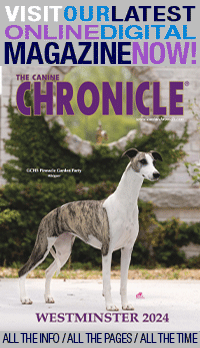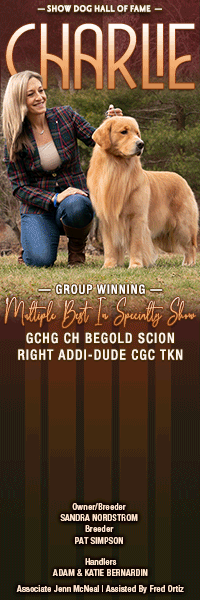Tips for a Winning Performance in the Ring
188 – March, 2018
BY DR. CARMEN BATTAGLIA
 Many Americans ignore their persistent feelings of anxiety, helplessness, fear and anger. In the dog world most of us know at least one person who has expressed a problem known to produce stress, isolation, fatigue or the fear of failure. These feelings have also been associated with: sadness, loss of in- terest, changes in sleep patterns, moodiness, fatigue, restlessness, agitation, irritableness and gains or losses of weight. In competitive sports these feelings occur with different levels of intensity for var- ious reasons. Sheryl Sandberg, COO of Facebook, recently wrote that when you know of someone who suffers disappointment and pain, the natural inclination is to comfort and encourage them. Phrases like, “time heals all wounds!” and “everything happens for a reason” are some of the most common ones. Sociologists believe that shifting the conversation to ourselves is not helpful. “I totally know how you feel- my dog was sick all night with diarrhea,” etc. Studies show that most of us do not know how another feels or what would fix their problems. But we do know there are many ways to address these feelings. A glance into the dog world shows that many new and inexperienced breeders and exhibitors have these feelings. For new breeders it can begin by not knowing how to select breeding partners, choose puppies or manage their dog in the ring. Others will fall victim to the disappointment and feelings of failure when their dog does not win a ribbon.
Many Americans ignore their persistent feelings of anxiety, helplessness, fear and anger. In the dog world most of us know at least one person who has expressed a problem known to produce stress, isolation, fatigue or the fear of failure. These feelings have also been associated with: sadness, loss of in- terest, changes in sleep patterns, moodiness, fatigue, restlessness, agitation, irritableness and gains or losses of weight. In competitive sports these feelings occur with different levels of intensity for var- ious reasons. Sheryl Sandberg, COO of Facebook, recently wrote that when you know of someone who suffers disappointment and pain, the natural inclination is to comfort and encourage them. Phrases like, “time heals all wounds!” and “everything happens for a reason” are some of the most common ones. Sociologists believe that shifting the conversation to ourselves is not helpful. “I totally know how you feel- my dog was sick all night with diarrhea,” etc. Studies show that most of us do not know how another feels or what would fix their problems. But we do know there are many ways to address these feelings. A glance into the dog world shows that many new and inexperienced breeders and exhibitors have these feelings. For new breeders it can begin by not knowing how to select breeding partners, choose puppies or manage their dog in the ring. Others will fall victim to the disappointment and feelings of failure when their dog does not win a ribbon.
These scenarios remind me of a story about my visits to a breeder’s home to discuss one of their breedings. I recall sitting at their kitchen table watching them bring the records they used for the breeding. I listened to stories about many important dogs, and within a few minutes the table was covered with pedigrees, ribbons, pictures, trophies and glassware. I asked if anything on the table was heritable. When we discussed their breedings, they were quick to mention a few important dogs by name, along with their titles and certifications, which led me to another question about the re- liability of titles and certifications, and how these things influenced their breeding decisions. To further my discussion, I asked why they used a particular female. Most would answer by saying, “she is the only one they had” or “she was in heat”. Then I asked about the male used to sire the litter and why they used him when they could have picked any male in the breed. The most popular answer was, “I like what he produced”. Perhaps a better question would have been, what have you seen out of him that you liked? These conversations usually produce some stress and frustration as they begin to realize that their answers are insufficient, not insightful, and likely to lead to mistakes. Thus, it is not surprising that new breeders often experience stress and frustration. But they are not alone.
Click here to read the complete article188 – March, 2018
Short URL: http://caninechronicle.com/?p=140994
Comments are closed











